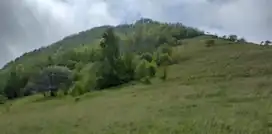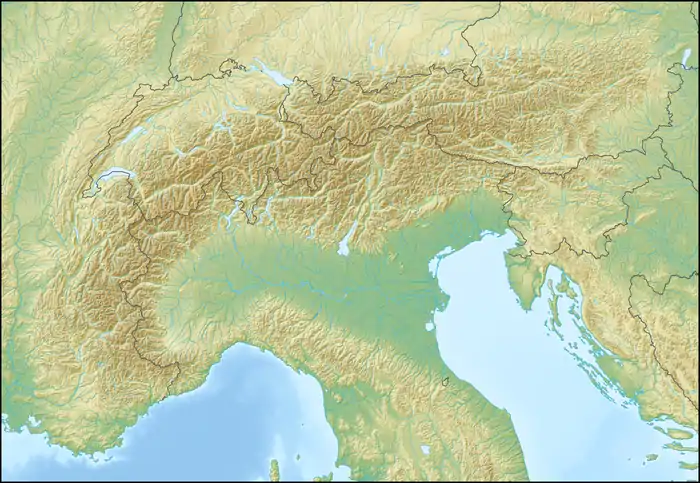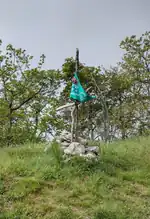Monte Alpe
The Monte Alpe (or La Rocca, or Monte Alpe Est, 1.056 m[1]) is a mountain of the Ligurian Prealps, the eastern section of the Ligurian Alps.
| Monte Alpe | |
|---|---|
| La Rocca, Monte Alpe Est | |
 View from Sella d'Alpe | |
| Highest point | |
| Elevation | 1,056 m (3,465 ft)[1] |
| Prominence | 151 m (495 ft)[2] |
| Coordinates | 44°07′31″N 8°05′15″E |
| Geography | |
 Monte Alpe Location in the Alps | |
| Location | Liguria, Italy |
| Parent range | Ligurian Alps |
| Climbing | |
| First ascent | ancestral |
| Easiest route | footpath from Erli |
Features


The mountain stands between the comunes of Castelbianco and Erli, both in the provincia di Savona (Italy). It belongs to the Pennavaira/Neva; its prominence is of 151 metres.[2] The Sella d'Alpe (938 m[3]) divides the main summit of Monte Alpe, at an elevation of 1056 m,[1] from a W summit at 1035 m. NW of this elevation the Neva/Pennavaira ridge goes on with Monte delle Gettine and Pizzo Castellino and, after the saddle of Passo delle Caranche, meets the main chain of the Alps at Monte Galero.[4] Towards SE the ridge quickly drops, ending up close to the village of Marinetto, at the connfluence between the two rivers.[4]
The summit of Monte Alpe is marked by a small cairn.[5] The mountain is shrouded by thick woods which, both close to its main elevation and the W summit, leave places to grassland.[5] On the Monte Alpe flanks there are several rock outcrops, some of them very steep or vertical and used by enthusiasts as a climbing area. The lower slopes of the mountain are occupied by olive trees plantations and by other Mediterranean cultivations.[3]
SOIUSA classification
According to the SOIUSA (International Standardized Mountain Subdivision of the Alps) the mountain can be classified in the following way:[6]
- main part = Western Alps; major sector = South Western Alps, section = Ligurian Alps, subsection = Prealpi Liguri
- supergroup = Catena Settepani-Carmo-Armetta, group = Gruppo Galero-Armetta, subgroup = Dorsale del Pizzo Castellino, code = I/A-1.I-A.3.b
Geology
Monte Alpe, from a geological point of view, features limestone dating back to the Triassic era.[7] The area located between Monte Alpe and Monte Galero is characterized by quite a high landslide risk.[8]
Access to the summit

Monte Alpe can be easily reached on foot following the ridge which connects it with Monte Galero.[1] Others hiking routes start from Erli[5] and Veravo (comune of Castelbianco).[3]
Mountain bike
The ascent to Monte Alpe is considered a mountain bike itinerary considered quite demanding, but very satisfactory too.[9]
References
- Montagna, Montalto 1981, p. 241-242.
- "Monte Alpe". peakery.com. Retrieved 2022-05-18.
- Marco Piana. "Da Veravo al Monte Alpe" (PDF) (in Italian). verdeazzurroligure.com. Retrieved 2022-05-17.
- IGM & 1:25.000 official Italian map.
- Filippo Ceragioli (14 May 2022). "Le due cime del Monte Alpe" (in Italian). MountainHall. Retrieved 2022-05-17.
- Marazzi 2005, p. 62.
- AA.VV. (comitato geologico) (1909). Bollettino del Servizio geologico d'Italia (in Italian). Vol. 40. Instituto poligrafico e zecca della stato. pp. 13–14. Retrieved 2022-05-17.
- AA.VV. "Idrografia". Analisi Ambientale (PDF) (in Italian). Comune di Castelbianco. p. 9. Retrieved 2022-05-18.
- Andrea Codda (18 January 2019). "Monte Alpe (1055 m)" (in Italian). cicloalpinismo.com. Retrieved 2022-05-17.
Bibliography
- Marazzi, Sergio (2005). Atlante Orografico delle Alpi. SOIUSA (in Italian). Pavone Canavese: Priuli & Verlucca editori. ISBN 9788880682738.
- Montagna, Euro; Montaldo, Lorenzo (1981). Alpi Liguri. Guida dei Monti d'Italia (in Italian). Milano: CAI / TCI.
Maps
- Cartografia ufficiale italiana in scala 1:25.000 e 1:100.000 (Map). Istituto Geografico Militare.
- Comunità montana ingauna - il suo comprensorio - Cartografia regionale in scala 1:25.000 (Map). Albenga: Comunità montana ingauna. 1998.